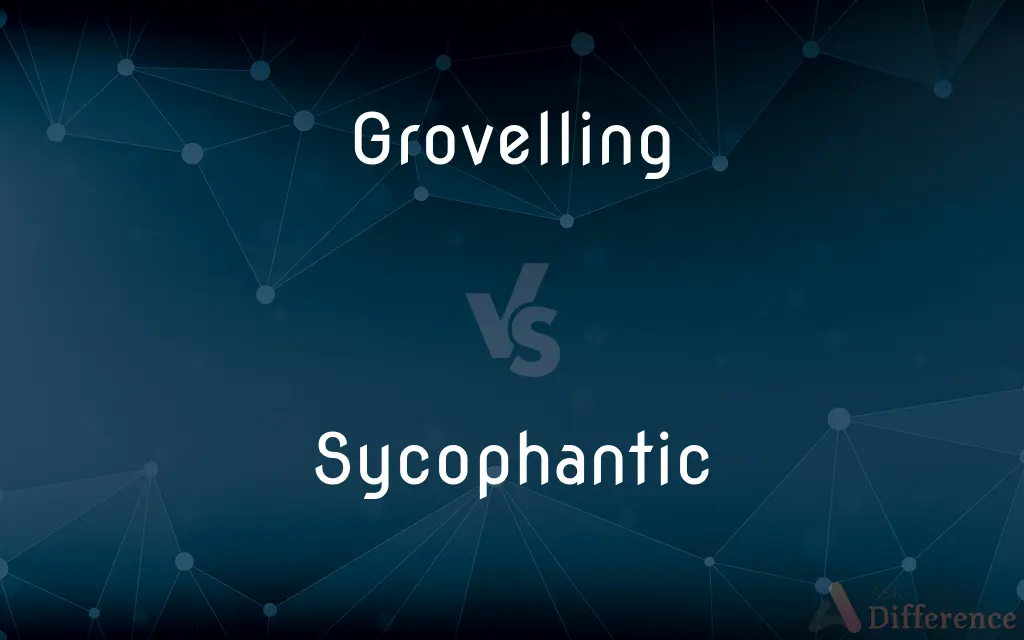Grovelling vs. Sycophantic — What's the Difference?
By Urooj Arif & Maham Liaqat — Updated on April 14, 2024
Grovelling involves showing excessive humility or submission, often in a demeaning manner, while sycophantic refers to flattering influential people to gain advantage.

Difference Between Grovelling and Sycophantic
Table of Contents
ADVERTISEMENT
Key Differences
Grovelling typically involves actions that suggest a very low self-esteem or self-worth, such as literally getting on one’s knees. On the other hand, sycophantic behavior, while also demeaning, is more about excessive flattery and insincere praise aimed at gaining favor.
Grovelling can occur in any social interaction where one person feels the need to show extreme submission to another. Whereas sycophantic actions are usually targeted at individuals who hold power or influence, highlighting a strategic, often manipulative intent.
The intent behind grovelling is often to avoid conflict or to appease someone seen as a threat. On the other hand, sycophantic behavior is typically motivated by the desire to achieve personal gain, such as career advancement or social status.
Grovelling is generally perceived negatively as it portrays a person as spineless or overly subservient. In contrast, sycophantic behavior might occasionally be tolerated or even rewarded in environments like politics or corporate cultures, where currying favor can lead to real benefits.
Both grovelling and sycophantic actions can be seen as forms of social manipulation, but grovelling is more about submission and appeasement, whereas sycophancy focuses on ingratiation and flattery.
ADVERTISEMENT
Comparison Chart
Definition
Showing excessive humility or submission
Flattering people in power to gain favor
Motivation
Avoidance of conflict or punishment
Personal gain or advancement
Typical Context
Personal interactions
Professional or political environments
Perception
Negative, seen as spineless
Negatively but can be strategically effective
Relationship to Power
May not involve power dynamics
Involves power dynamics explicitly
Compare with Definitions
Grovelling
Acting in an obsequious manner to gain favor or forgiveness.
He was grovelling at her feet, begging for her forgiveness.
Sycophantic
Acting with an ulterior motive of climbing the social or corporate ladder.
He adopted a sycophantic demeanor to influence the committee's decision.
Grovelling
Exaggerating one’s incompetence or unworthiness to avoid responsibility.
He's grovelling and playing the fool to avoid taking on more work.
Sycophantic
Behaving or acting obsequiously for personal gain.
His sycophantic laughter at every mediocre joke the boss made was quite transparent.
Grovelling
Showing submission or fear through one’s actions or posture.
The employee's grovelling manner during the meeting was uncomfortable to watch.
Sycophantic
Exhibiting servility or subservience in a flattering way.
Her sycophantic tone when speaking with the executives was a strategy to secure her promotion.
Grovelling
Behaving in a way that is excessively humble or apologetic.
She started grovelling, apologizing for mistakes she hadn't even made.
Sycophantic
Using flattery to gain favor from individuals in authority.
She was openly sycophantic, complimenting her supervisor on even the smallest decisions.
Grovelling
Demonstrating a very low self-esteem or self-worth in actions.
His grovelling during the appraisal was unnecessary and demeaning.
Sycophantic
Ingratiating oneself with someone to advance one’s interests.
His sycophantic attitude at the conference aimed to gain him professional contacts.
Grovelling
To behave in a servile or obsequious manner.
Sycophantic
A person who attempts to gain advantage by flattering influential people or behaving in a servile manner.
Grovelling
To lie or creep in a prostrate position, as in subservience or humility.
Sycophantic
Obsequious, flattering, toadying. In other words, eager to please.
Grovelling
To give oneself over to base pleasures
"Have we not groveled here long enough, eating and drinking like mere brutes?" (Walt Whitman).
Sycophantic
Of or pertaining to a sycophant; characteristic of a sycophant; meanly or obsequiously flattering; courting favor by mean adulation; parasitic.
To be cheated and ruined by a sycophantical parasite.
Sycophantic servants to the King of Spain.
Grovelling
(British) grovel
Sycophantic
Attempting to win favor from influential people by flattery
Grovelling
The act of one who grovels.
Grovelling
Totally submissive
Common Curiosities
What motivates sycophantic behavior?
The primary motivation for sycophantic behavior is personal gain, such as career advancement or increased social standing.
How do others generally view grovelling?
It is usually perceived as a sign of weakness or low self-esteem.
Is sycophantic behavior always related to power dynamics?
Yes, sycophantic behavior typically involves flattering those in positions of power or authority.
Can grovelling ever be positive?
Generally, grovelling is viewed negatively, though it might be seen as a strategy for de-escalation in conflict situations.
Are there any benefits to sycophantic behavior?
While seen negatively, sycophancy can sometimes lead to professional advantages or preferential treatment.
Is there a difference in how grovelling and sycophantic actions are initiated?
Grovelling is more spontaneous and driven by fear or desperation, whereas sycophancy is usually premeditated and strategic.
What does grovelling typically involve?
Grovelling often involves actions that portray extreme submission, such as kneeling or begging.
How can one identify sycophantic behavior?
It often involves disproportionate praise or flattery, especially in contexts where the flatterer stands to gain something.
Why might someone choose sycophantic tactics in the workplace?
They might believe it's the most effective way to gain promotions or favor from supervisors.
What's a typical scenario for grovelling?
A typical scenario might involve an employee excessively apologizing to their supervisor to avoid harsh criticism or punishment.
Can sycophancy be strategic?
Yes, sycophancy is often used strategically in professional and political contexts to curry favor and facilitate upward mobility.
How does society typically respond to sycophantic individuals?
Generally, society views sycophantic individuals with distrust and disdain, although their tactics might occasionally be successful.
What distinguishes grovelling from other forms of submission?
Grovelling is distinguished by its extreme nature and often humiliating postures or expressions.
Does sycophancy involve deception?
Yes, sycophancy can involve a level of deception, as the flattery is typically insincere and self-serving.
What could reduce grovelling in a workplace?
Creating a more equitable and respectful work environment can reduce the need for employees to grovel.
Share Your Discovery

Previous Comparison
Amble vs. Ramble
Next Comparison
Outputted vs. OutputAuthor Spotlight
Written by
Urooj ArifUrooj is a skilled content writer at Ask Difference, known for her exceptional ability to simplify complex topics into engaging and informative content. With a passion for research and a flair for clear, concise writing, she consistently delivers articles that resonate with our diverse audience.
Co-written by
Maham Liaqat













































